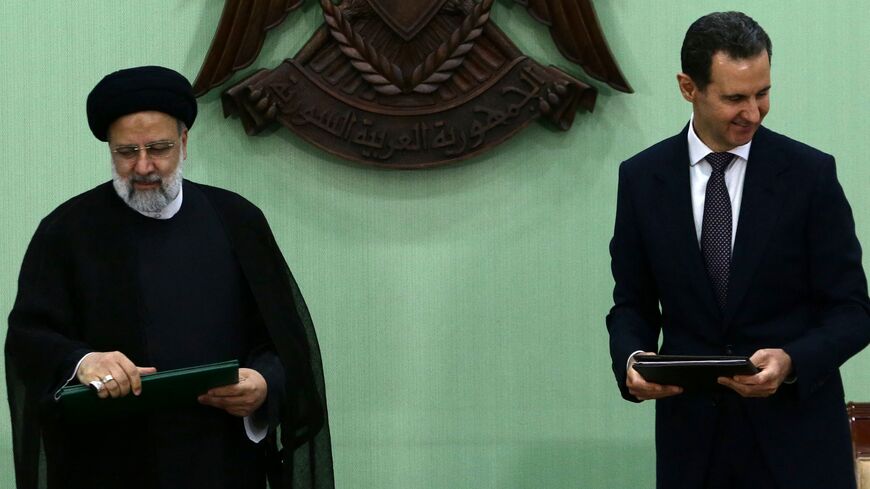During his state visit to Syria this week, Iran's President Ebrahim Raisi made his way to the Sayyida Zaynab, a shrine on the outskirts of Damascus dedicated to the daughter of Ali, Shia Islam’s first imam, for a speech loaded with symbolism.
The shrine is one of the most revered pilgrimage destinations for Shia Muslims, so no surprise Raisi made it the venue for one of the most important foreign policy speeches of his presidency.
Raisi is the first Iranian president to visit Syria since Mahmoud Ahmadinejad in 2010. It may seem like an overdue visit, as it was Iran, along with Russia, that backed Syrian President Bashar al-Assad through the 2011 revolution and subsequent deadly civil war. For Iranian leaders, Syria is a victory for the so-called resistance axis, in a war that it has blamed on the United States, Israel and Saudi Arabia.
In his speech at the shrine, Raisi left out any mention of Saudi Arabia, a sign of the times, given Iran’s reconciliation with the kingdom. But he positioned himself as one of the leaders of the resistance axis, alongside Assad and Hezbollah leader Hasan Nasrallah.
The season of political pilgrimage to Syria by regional leaders made it necessary for the Iranians to flex their muscles and state clearly that their leverage in Damascus is untouchable.
Raisi wanted to make it clear that they have the upper hand in announcing the end of the war. "After 12 years of war, Syria has emerged victorious, and we are gathered here to celebrate this victory," he said, adding that Iran will stand by Syria in the period of reconstruction.
It is hard to understate the impact, and costs, of the war on Iran, especially under sanctions. Funerals of fighters killed in the Syrian war are still coming to Tehran and other Iranian cities, whether due to Israeli airstrikes or ordinary warfare.
Those who Iran announces as martyrs in Syria are now dealt with similarly to the soldiers who were killed during the eight-year war in Iraq. Books about the fighters, or memoirs like the famous “Letters of the Fish” diary by General Hussein Hamedani, present Iran’s narrative about the war.
This same narrative that Raisi demonstrated while in Syria was promoted by his foreign minister, Hussein Amir-Abdollahian, in a book that was published in 2020.
Amir-Abdollahian who was a deputy foreign minister when the crisis started in 2011, narrated his country’s role in Syria, the reasons behind the war, the main players, and the role of Iran in putting together a plan to save Assad.
According to Amir-Abdollahian, the book was written upon the request of slain IRGC Quds force commander Qassem Soleimani, who he gives credit for convincing Moscow to send troops to Syria. He also describes Soleimani’s last visit to Baghdad, accusing the US of killing him to sabotage a possible Saudi-Iranian settlement.
In the book, Amir-Abdollahian details his country’s view on how each major regional player dealt with the Syrian crisis. He accused the United States, Israel, Saudi Arabia and their allies of deciding to hit Iran as the head of the resistance pyramid, describing it as “decapitation policy” or “cutting the snake’s head.”
“Syria is one of the most important components of the resistance axis”, the Iranian top diplomat offered. “They thought that if they manage to destabilize Syria, they’ll interrupt the connection between members of the resistance coalition and change the balance of power in the region radically.”
The reason Iran has not pushed for reforms in Syria, he said, is that even if the relationship is good, “according to diplomatic norms, it is not possible to tell a country that its political system suffers from some problems; and that they must find a solution to it."
The Iranian narrative explained by Amir-Abdollahian is that Assad was “quick to implement political reforms, but the problem was that other parties were unwilling to recognize the country’s legitimate president, paid no attention to the reforms and sought to bring down the political system.”
On this issue, he concludes that when Damascus requested help from Tehran, “we tried to transfer some issues that we saw as essential in achieving security, while preserving the prestige of the Syrian state.”







